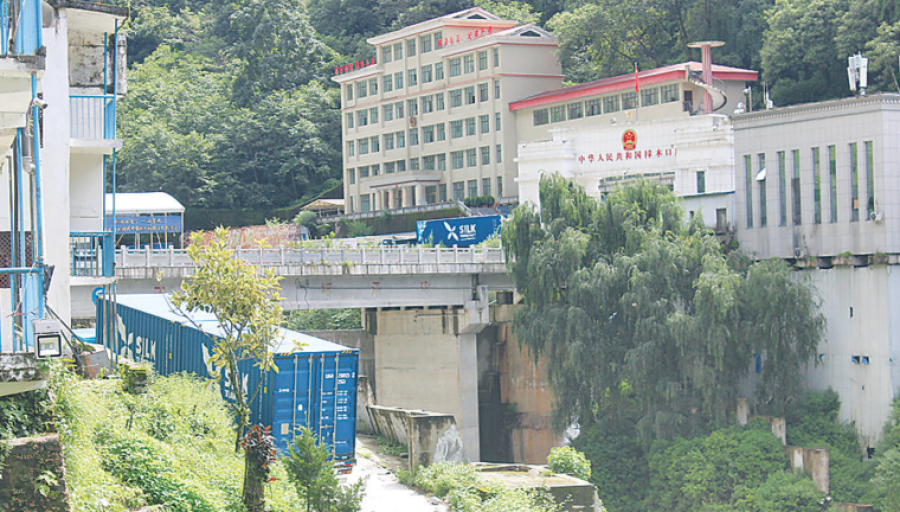Money
Beijing to allow people’s movement in Tatopani border point
Before the earthquake, nearly 30,000 Chinese tourists used to enter Nepal from the Tatopani border point.
Anish Tiwari
Beijing has decided to re-open the Tatopani border point for people’s movement from September after reopening two-way cargo movements on May 1, according to Nepali authorities.
“The 11th meeting of the Nepal-Tibet Trade Facilitation Committee held on Sunday agreed to open the border for the general public within the next two months,” said Ramesh Neupane, chief district officer of Sindhupalchowk district.
The meeting was chaired by Ram Chandra Tiwari, joint secretary at the Ministry of Industry, Commerce and Supplies, including several other officials from Nepal and China.
In May this year, the border was opened eight years after the devastating earthquake of April 2015.
Before the earthquake, nearly 30,000 Chinese tourists used to enter Nepal from the Tatopani border point. Local traders were also allowed to travel to Tibet for business.
"The meeting has concluded. But we have not received any official or unofficial communication. As the decision has been made at the higher level, we are coordinating and preparing accordingly,” said Neupane.
Nepali and Chinese officials had already held the meeting on three different occasions regarding the opening of the border for travellers.
The Chinese authorities are particularly concerned about the cross-border crime issue, which they have raised on several occasions.
Both sides have been discussing a wide range of issues including the transmission of information, border security arrangements and patrolling to mitigate and control crimes.
Ravindra Pokharle, chief of Tatopani Immigration Office, said that they have not received any official information from the Chinese side. “Discussion is underway regarding the issue.”
"Even if nothing is confirmed at the district level, we think that the decision is being made at a higher level in Kathmandu,” said Neupane.
“Although the border has been opened, the trade movement is insignificant,” said Dayanand KC, chief of the Tatopani Customs Office.
Since May, goods worth Rs4.2 million have been exported in seven containers that included bamboo seats and utensils.
“The export is almost at a standstill,” KC said. He said that 4-5 containers are coming from China on a daily basis.
Due to low trade activities, revenue collection has not matched the target set by the customs, KC said.
The customs targeted revenue collection of Rs4.62 billion but were only able to collect Rs3.27 billion, which is 70 percent of the targeted amount, said KC.
KC said they were optimistic that by opening the border for travellers, the customs revenue would increase.
Tatopani and its adjoining areas like Liping Bazaar have been wearing deserted looks while on the Chinese side, new infrastructure is being built.
Anyone who arrived at the Tatopani border is often aghast by the poor infrastructure on Nepal’s side.
Apart from the Miteri bridge and Tatopani dry port built by the Chinese company, all other important structures like immigration, gates, and security posts on Nepal’s side are in a dilapidated condition.
The 26-km of the Kodari highway, connecting the border, is yet to be repaired.
Traders say it is risky to drive the goods-laden containers on the highway connecting the international border.
Beginning March 15, Beijing allowed its citizens to travel to Nepal as tourists after more than three years.
The Ministry of Culture and Tourism of the People’s Republic of China, through its notice, had allowed national travel agencies and online travel companies to resume, on a pilot basis, the outbound group tours for Chinese citizens to Nepal.
Chinese arrivals to Nepal crossed the 100,000 mark for the first time in 2013, largely due to the improved air links between the two countries. Around 93 percent of Chinese tourists were first-time visitors to Nepal, according to the Tourism Ministry’s statistics.
In 2014, Nepal received 123,805 Chinese visitors.
The back-to-back 2015 earthquake and the blockade by India led to arrivals from China dropping to a four-year low of 64,675 individuals in 2015, down 47.76 percent from 2014.
The surface road at the Tatopani border point where Nepal used to receive a large number of Chinese tourists was also blocked.




 16.12°C Kathmandu
16.12°C Kathmandu














